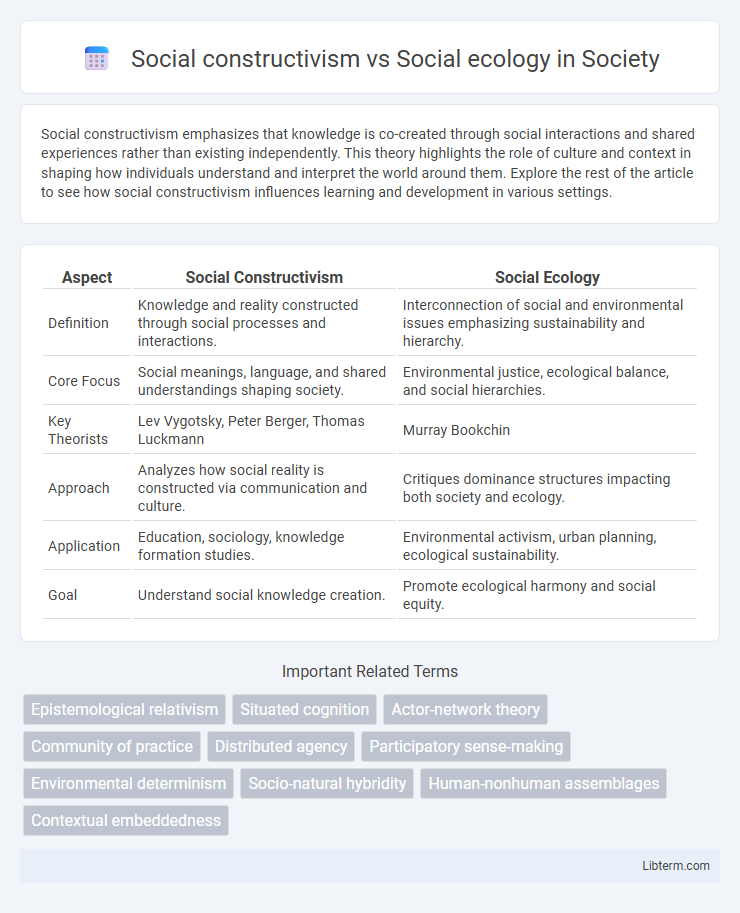Social constructivism emphasizes that knowledge is co-created through social interactions and shared experiences rather than existing independently. This theory highlights the role of culture and context in shaping how individuals understand and interpret the world around them. Explore the rest of the article to see how social constructivism influences learning and development in various settings.
Table of Comparison
| Aspect | Social Constructivism | Social Ecology |
|---|---|---|
| Definition | Knowledge and reality constructed through social processes and interactions. | Interconnection of social and environmental issues emphasizing sustainability and hierarchy. |
| Core Focus | Social meanings, language, and shared understandings shaping society. | Environmental justice, ecological balance, and social hierarchies. |
| Key Theorists | Lev Vygotsky, Peter Berger, Thomas Luckmann | Murray Bookchin |
| Approach | Analyzes how social reality is constructed via communication and culture. | Critiques dominance structures impacting both society and ecology. |
| Application | Education, sociology, knowledge formation studies. | Environmental activism, urban planning, ecological sustainability. |
| Goal | Understand social knowledge creation. | Promote ecological harmony and social equity. |
Understanding Social Constructivism: Key Principles
Social constructivism emphasizes that knowledge is co-created through social interactions and cultural contexts, highlighting the role of language and shared experiences in shaping understanding. Key principles include the idea that learning is active and collaborative, occurring within communities where individuals negotiate meaning and construct reality together. This approach contrasts with social ecology, which prioritizes the interconnectedness of humans with their environment and systemic influences on societal behavior.
Defining Social Ecology: Core Concepts
Social ecology emphasizes the interconnectedness of social, environmental, and economic systems, focusing on how hierarchical power structures contribute to ecological degradation and social injustice. Defining core concepts involves understanding human behavior as shaped by social environments and advocating for decentralized, community-based solutions to promote sustainability and equity. This approach contrasts with social constructivism, which primarily explores how social realities and knowledge are constructed through language and interaction without a direct emphasis on ecological systems.
Historical Origins of Social Constructivism and Social Ecology
Social constructivism emerged primarily from the works of Lev Vygotsky in the early 20th century, emphasizing the role of social interaction and cultural context in cognitive development and knowledge formation. Social ecology, founded by Murray Bookchin in the 1960s, originates from ecological philosophy and critiques hierarchical structures, linking environmental issues with social problems through interdisciplinary analysis. Both frameworks highlight the influence of social environments but diverge in focus, with social constructivism centering on knowledge creation and social ecology addressing the relationship between society and ecological sustainability.
Comparative Analysis: Social Reality in Both Frameworks
Social constructivism emphasizes that social reality is shaped through collective human interactions, language, and shared understandings, highlighting the role of cognition and communication in constructing knowledge. In contrast, social ecology focuses on the dynamic interdependence between human societies and their environments, asserting that social problems arise from hierarchical structures and ecological imbalances. Both frameworks analyze social reality by acknowledging external influences but differ as social constructivism centers on subjective meaning-making processes, while social ecology foregrounds structural and environmental determinants.
Human-Environment Interaction: Constructivist vs Ecological Perspectives
Social constructivism views human-environment interaction as a product of socially constructed meanings, emphasizing how cultural beliefs and knowledge shape environmental perceptions and behaviors. In contrast, social ecology considers interactions within natural and social systems, focusing on structural inequalities and ecological interdependence that influence environmental outcomes. This contrast highlights constructivism's focus on cognitive frameworks versus social ecology's emphasis on systemic relationships and power dynamics in shaping human-environment interactions.
Knowledge Formation: Social Processes and Environmental Contexts
Social constructivism emphasizes knowledge formation through collaborative social interactions and language within cultural contexts, highlighting how shared meanings shape understanding. In contrast, social ecology integrates environmental contexts, arguing that knowledge arises from the interconnectedness of social systems and ecological environments, stressing the influence of physical surroundings on cognitive processes. Together, these frameworks illustrate that knowledge is both socially negotiated and environmentally situated, reflecting dynamic interactions between societal structures and natural ecosystems.
Applications in Education and Community Development
Social constructivism emphasizes collaborative learning processes where knowledge is co-constructed through social interactions, promoting critical thinking and problem-solving skills in educational settings. Social ecology integrates environmental, social, and cultural factors to address systemic issues, guiding community development initiatives towards sustainable and equitable outcomes. Both frameworks support participatory approaches but apply social constructivism primarily in classroom dynamics, while social ecology informs broader community planning and environmental justice efforts.
Critiques and Limitations of Social Constructivism
Social constructivism faces critiques for its potential relativism, as it emphasizes knowledge as socially constructed, often overlooking objective realities and biological factors influencing human behavior. Critics argue it underestimates the material and environmental constraints highlighted by social ecology, which focuses on the interdependence between humans and their natural surroundings. The limitation of social constructivism lies in its tendency to neglect power structures and ecological contexts that shape social phenomena beyond mere social interactions and shared understandings.
Challenges and Criticisms of Social Ecology
Social ecology faces challenges related to its broad, interdisciplinary approach, which critics argue can dilute focus and practical applicability in addressing environmental problems. The framework is sometimes criticized for underestimating the complexity of social power dynamics and institutional resistance that hinder ecological reforms. Furthermore, social ecology's emphasis on decentralization and community autonomy may struggle against globalized economic forces and centralized governance structures.
Integrating Social Constructivism and Social Ecology: A Synergistic Approach
Integrating Social Constructivism and Social Ecology offers a synergistic approach to understanding human-environment interactions by combining the emphasis on social learning and knowledge construction with ecological systems theory. This framework highlights how individual and collective meanings shape environmental behaviors while recognizing the complex interdependencies within socio-ecological systems. Such integration enhances adaptive capacity and promotes sustainable solutions through participatory processes and multi-scalar analysis.
Social constructivism Infographic

 libterm.com
libterm.com